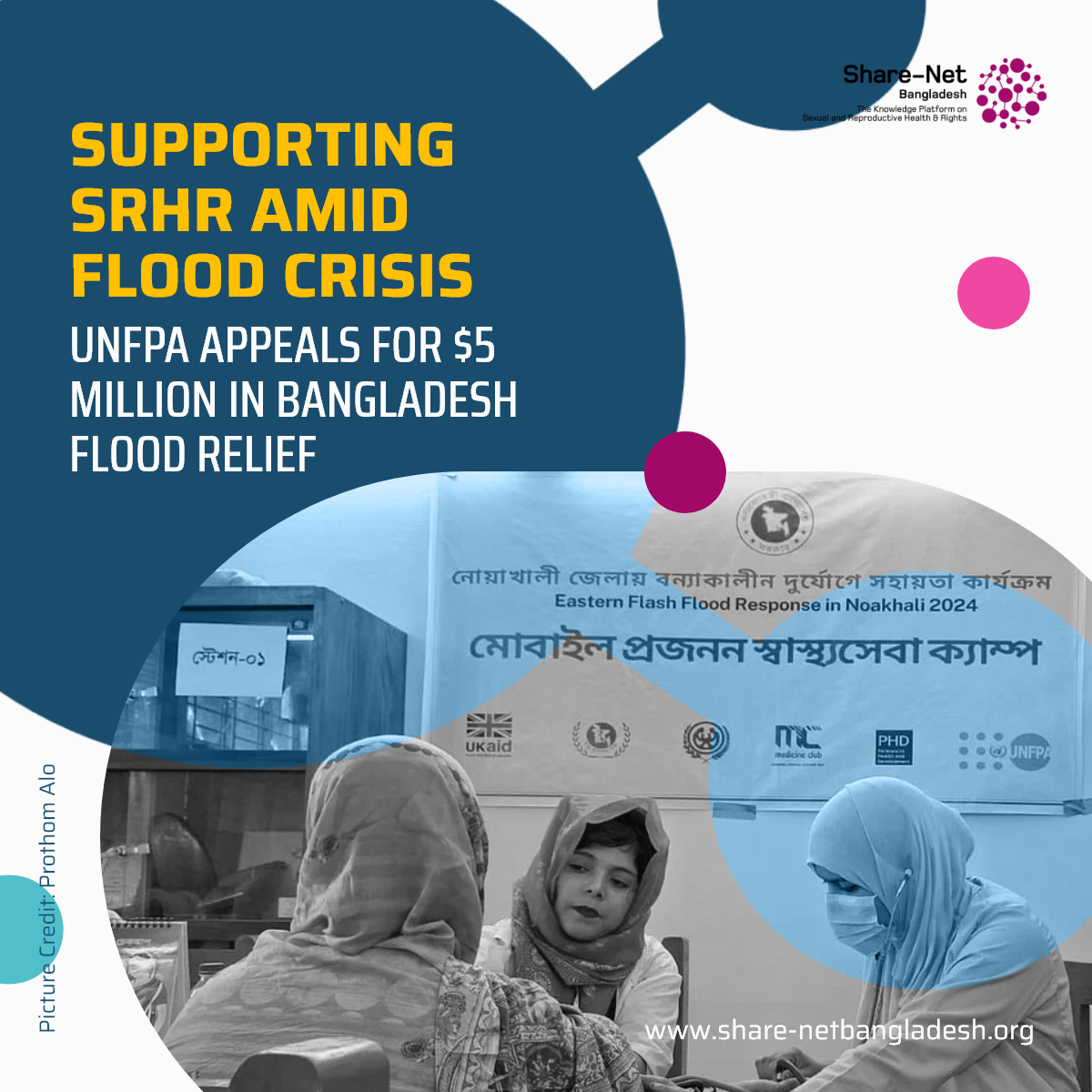Supporting SRHR Amid Flood Crisis: UNFPA Appeals for $5 Million in Bangladesh Flood Relief
Over 5.82 million people in southeastern Bangladesh have been severely impacted by flash floods, with women, adolescent girls, and marginalised gender-diverse communities facing heightened risks. The United Nations Population Fund (UNFPA) has made an urgent appeal for $5 million in funding to address the dire needs of these vulnerable populations. Over 78,000 pregnant women in the affected areas require immediate support, with many expected to give birth in the coming weeks.
“Pregnant women and adolescent girls are particularly at risk, cut off from essential healthcare, clean water, and safe shelter,” said Kristine Blokhus, UNFPA’s representative in Bangladesh. “In these conditions, safe childbirth and access to reproductive health are urgent needs that cannot be overlooked.”
The relentless monsoon rains, worsened by climate change, have submerged vast areas in Noakhali, Feni, and Khagrachhari, displacing millions. Women and girls are particularly vulnerable to gender-based violence in overcrowded evacuation centers that lack sufficient security and privacy. Reports indicate an increase in sexual and reproductive health challenges, as many of these shelters are without adequate sanitation and menstrual health resources.
UNFPA has collaborated with the United Kingdom’s Foreign, Commonwealth, and Development Office and Australian Aid to mobilise immediate relief. This aid includes dignity kits, menstrual hygiene products, and mobile reproductive health clinics. Over 2,000 women and girls have received emergency care so far, but the demand continues to rise.
Immediate SRHR Concerns for Flood-Affected Women and Girls
For women and girls in flood-affected regions, the absence of health services and essential supplies creates severe sexual and reproductive health and rights (SRHR) challenges. According to Blokhus, the crisis highlights the vulnerabilities caused by inadequate infrastructure and the climate crisis. “The climate emergency makes severe weather events like these more frequent. Coordinated humanitarian efforts are vital to prevent more loss of life and to protect those most at risk,” she added.
UNFPA’s mobile clinics and health volunteers are working on the ground, providing critical support in areas that are otherwise inaccessible. Despite logistical obstacles, these teams are offering primary health care, reproductive health consultations, and support for gender-diverse populations. The support also extends to distributing clean birthing kits and arranging cash aid to help the most marginalised households.
Call for Coordinated, Gender-Sensitive Humanitarian Aid
UNFPA’s call for $5 million in emergency funds emphasises the need for gender-sensitive humanitarian assistance to protect the SRHR of flood-impacted populations. “Basic needs like safe delivery, menstrual hygiene, and protection from violence are often overlooked in crises,” says Dr. Nusrat, a reproductive health worker deployed in Noakhali. “This funding can ensure that health services continue for pregnant women and adolescent girls who face multiple vulnerabilities right now.”
To prevent long-term health and rights violations, UNFPA advocates for a crisis response that prioritises SRHR issues, emphasising the role of local partnerships. “We’re committed to working with the government to keep women and girls safe, protect reproductive rights, and provide essential health services. This crisis demands attention to the unique needs of women and marginalised communities, or we risk deepening the impact on their lives,” Blokhus stated.
The climate crisis has brought renewed urgency to Bangladesh’s flood response. The need for coordinated action is underscored by Blokhus’ appeal: “Only through joint humanitarian efforts and increased funding can we mitigate the impact on Bangladesh’s most vulnerable communities.”
As Bangladesh faces rising climate challenges, UNFPA’s call for resources serves as a reminder of the essential role of SRHR-focused aid in disaster response. With increased funding, UNFPA and its partners can better support those who need it most, ensuring that basic health, safety, and dignity remain central to relief efforts.
Source: Prothom Alo
Picture Credit: Prothom Alo

